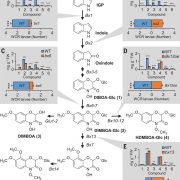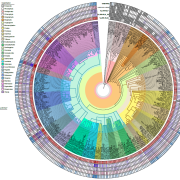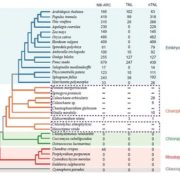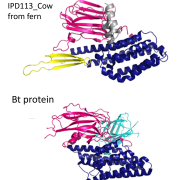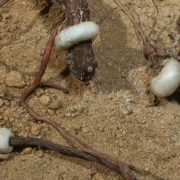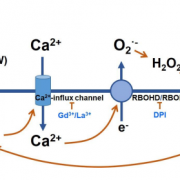Dual impact of elevated temperature on plant defense and bacterial virulence in Arabidopsis
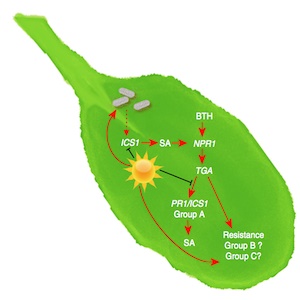 Huot et al. describe how elevated temperature (30 °C) enhances Arabidopsis thaliana disease susceptibility to the bacteria Pseudomonas syringae pv. tomato DC3000 (Pst DC3000): this includes an increase of bacterial type III secretion suggesting that increased Pst DC3000 virulence at 30°C is linked to increased translocation of bacterial effector proteins. The authors also found that enhanced disease susceptibility is independent of the phyB/PIF network which has previously been implicated in temperature sensing. Meanwhile the salicylic acid biosynthesis pathway is compromised at this elevated temperature, meaning that pathogen-induced salicylic acid production is a key temperature-vulnerable step in the defense network. Information gathered by Huot et al. might be useful for genetic manipulation of temperature-related genes of the plant immune system in order to enhance resilience to combined abiotic and biotic stress conditions in the today’s climate change scenario. (Summary by Isabel Mendoza) Nature Comms 10.1038/s41467-017-01674-2
Huot et al. describe how elevated temperature (30 °C) enhances Arabidopsis thaliana disease susceptibility to the bacteria Pseudomonas syringae pv. tomato DC3000 (Pst DC3000): this includes an increase of bacterial type III secretion suggesting that increased Pst DC3000 virulence at 30°C is linked to increased translocation of bacterial effector proteins. The authors also found that enhanced disease susceptibility is independent of the phyB/PIF network which has previously been implicated in temperature sensing. Meanwhile the salicylic acid biosynthesis pathway is compromised at this elevated temperature, meaning that pathogen-induced salicylic acid production is a key temperature-vulnerable step in the defense network. Information gathered by Huot et al. might be useful for genetic manipulation of temperature-related genes of the plant immune system in order to enhance resilience to combined abiotic and biotic stress conditions in the today’s climate change scenario. (Summary by Isabel Mendoza) Nature Comms 10.1038/s41467-017-01674-2


